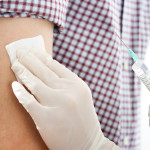 You may have heard about Gardasil® and Gardasil 9® on TV, at a health care provider’s office, or from a friend. These important vaccines are recommended by the CDC (Centers for Disease Control) for use in young men and boys. This means that guys now have a great preventive option against the types of the HPV virus that cause genital warts and anal cancer.
You may have heard about Gardasil® and Gardasil 9® on TV, at a health care provider’s office, or from a friend. These important vaccines are recommended by the CDC (Centers for Disease Control) for use in young men and boys. This means that guys now have a great preventive option against the types of the HPV virus that cause genital warts and anal cancer.
What is HPV?
HPV is the most common STI. More than 40 types of HPV are sexually transmitted and can cause infections in the genitals, mouth, and throat. Because there are so many types of HPV, they are referred to by number. For example, 6 and 11 cause approximately 90% of genital warts. Other types cause anal cancer.
How do people get HPV?
HPV is spread through genital contact, most often during vaginal and anal sex. It can also be passed on through digital contact and oral sex. In order for you to contract HPV, you have to have skin to skin contact with a person who already has HPV.
What can I do to prevent getting HPV?
The only sure way to prevent getting HPV is to be abstinent, or refrain from sexual contact altogether. If you’re having sexual contact, you can reduce your risk of infection by having a monogamous sexual relationship (having sex with only one person who only has sex with you) and by using condoms 100% of the time. Condoms aren’t perfect because they don’t cover all of the skin in the genital area, but they do lower chances of HPV infection.
A new and very important preventive option are the vaccines (Gardasil® and Gardasil 9®). Gardasil® and Gardasil 9® protect against genital warts and anal cancers in males. Gardasil® protects against four types of HPV: 6 and 11, which cause genital warts in men, and types 16 and 18, which have been linked to anal cancer in men. Gardasil 9® protects against 9 types of HPV, including those that can cause cancers and genital warts in men: 6, 11, 16, 18, 31, 33, 45, 52, and 58.
Is the vaccine safe?
Yes. These vaccines are considered safe by FDA standards. They do not contain mercury or thimerosal, and will not cause an HPV infection.
What about side effects?
Side effects are rare; however, some young men who get the vaccine may have pain, swelling, or redness where they got the injection. These temporary discomforts will go away within a few days. In very few cases, people may get a fever, feel dizzy, or feel nauseous. Some people have fainted after receiving the vaccine, so if you plan on getting it, it’s a good idea to sit or lie down for 10-15 minutes afterwards.
It’s very uncommon to have side-effects from vaccines. If you think you might have had a side-effect from a vaccine, talk to your health care provider. You can also call 1-800-822-7967 or visit vaers.hhs.gov.
When can I get vaccinated?
The vaccine is approved by the FDA for boys and young men ages 9 to 26, and the CDC recommends Gardasil® or Gardasil 9® vaccination start at age 11-12 years old. The best time for you to get vaccinated is before you have been exposed to HPV. However, you can still get vaccinated if you’ve had prior sexual contact because you might not have been exposed to all types of HPV yet.
The CDC recommends young men who weren’t vaccinated before can get vaccinated through age 21. The vaccine is also recommended for any man who has sex with men through age 26, and for men with compromised immune systems (including HIV) or organ transplants through age 26, if they did not get HPV vaccine when they were younger.
How many shots do I have to get?
Anyone receiving the HPV vaccine before their 15th birthday needs a total of 2 doses (instead of 3, which used to be the rule). The 2nd dose should be given 6-12 months after the first one.
However, anyone starting the HPV vaccine series after they turn 15 years old still needs to get 3 doses. The 2nd dose should be given 1-2 months after the first dose and the 3rd dose should be given 6 months after the first dose.
Will my insurance cover the vaccine?
Most health insurance covers the HPV vaccine, but some do not. If you’re covered under your parent’s insurance, check with them. If you have your own policy, you can call your insurance provider directly. If you pay for the vaccine on your own, each dose is about $130, and up to $390 for the full series.
Source: Read Full Article
